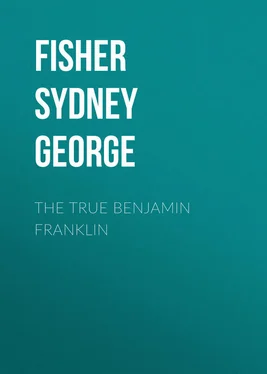Sydney Fisher - The True Benjamin Franklin
Здесь есть возможность читать онлайн «Sydney Fisher - The True Benjamin Franklin» — ознакомительный отрывок электронной книги совершенно бесплатно, а после прочтения отрывка купить полную версию. В некоторых случаях можно слушать аудио, скачать через торрент в формате fb2 и присутствует краткое содержание. Жанр: История, foreign_antique, foreign_prose, Биографии и Мемуары, на английском языке. Описание произведения, (предисловие) а так же отзывы посетителей доступны на портале библиотеки ЛибКат.
- Название:The True Benjamin Franklin
- Автор:
- Жанр:
- Год:неизвестен
- ISBN:нет данных
- Рейтинг книги:4 / 5. Голосов: 1
-
Избранное:Добавить в избранное
- Отзывы:
-
Ваша оценка:
- 80
- 1
- 2
- 3
- 4
- 5
The True Benjamin Franklin: краткое содержание, описание и аннотация
Предлагаем к чтению аннотацию, описание, краткое содержание или предисловие (зависит от того, что написал сам автор книги «The True Benjamin Franklin»). Если вы не нашли необходимую информацию о книге — напишите в комментариях, мы постараемся отыскать её.
The True Benjamin Franklin — читать онлайн ознакомительный отрывок
Ниже представлен текст книги, разбитый по страницам. Система сохранения места последней прочитанной страницы, позволяет с удобством читать онлайн бесплатно книгу «The True Benjamin Franklin», без необходимости каждый раз заново искать на чём Вы остановились. Поставьте закладку, и сможете в любой момент перейти на страницу, на которой закончили чтение.
Интервал:
Закладка:
This Uncle Benjamin, while in England, took a great interest in the nephew in America who was named after him, and he sent verses to him on all sorts of subjects. He was unsuccessful in business, lost his wife and all his children, save one, and finally came out to America to join the family at Boston.
Franklin’s mother was Abiah Folger, the second wife of his father. She was the daughter of Peter Folger, of Nantucket, a surveyor, who is described by Cotton Mather as a somewhat learned man. He made himself familiar with some of the Indian languages, and taught the Indians to read and write. He wrote verses of about the same quality as those of Uncle Benjamin. One of these, called “A Looking Glass for the Times,” while it is mere doggerel, shows that its author was interested in literature. He was a man of liberal views and opposed to the persecution of the Quakers and Baptists in Massachusetts.
From this grandfather on his mother’s side Franklin no doubt inherited his fondness for books, a fondness that was reinforced by a similar tendency which, though not very strong in his father, evidently existed in his father’s family, as Uncle Benjamin’s verses show. These verses sent to the boy Franklin and his efforts at times to answer them were an encouragement towards reading and knowledge. Franklin’s extremely liberal views may possibly have had their origin in his maternal grandfather, Peter Folger.
But independently of these suppositions as regards heredity, we find Franklin at twelve years of age reading everything he could lay his hands on. His first book was Bunyan’s “Pilgrim’s Progress,” which would not interest boys nowadays, and scarcely interests mature people any more; but there were no novels then and no story-books for boys. “Pilgrim’s Progress” is a prose story with dialogues between the characters, the first instance of this sort of writing in English, and sufficient to fascinate a boy when there was nothing better in the world.
He liked it so well that he bought the rest of Bunyan’s works, but soon sold them to procure Burton’s Historical Collections, which were forty small chapmen’s books, full of travels, adventures, history, and descriptions of animals, well calculated to stimulate the interest of a bright lad. Among his father’s theological books was Plutarch’s “Lives,” which young Franklin read eagerly, also De Foe’s “Essay upon Projects,” and Cotton Mather’s “Essays to do Good,” which he said had an important influence on his character.
He so hated cutting wicks and melting tallow that, like many other boys of his time, he wanted to run away to sea; and his father, to check this inclination and settle him, compelled him to sign articles of apprenticeship with his brother James, who was a printer. The child’s taste for books, the father thought, fitted him to be a printer, which would be a more profitable occupation than the ministry, for which he was at first intended.
So Franklin was bound by law to serve his brother until he was twenty-one. He learned the business quickly, stealing time to read books, which he sometimes persuaded booksellers’ apprentices to take from their masters’ shops in the evening. He would sit up nearly all night to read them, so that they might be returned early in the morning before they were missed.
He wrote ballads, like his uncle Benjamin and his grandfather Peter Folger, on popular events, – the drowning of a Captain Worthilake, and the pirate Blackbeard, – and, after his brother had printed them, sold them in the streets. His biographer, Weems, quotes one of these verses, which he declares he had seen and remembered, and I give it with the qualification that it comes from Weems:
“Come all you jolly sailors,
You all, so stout and brave;
Come hearken and I’ll tell you
What happened on the wave.
“Oh! ’tis of that bloody Blackbeard
I’m going now for to tell;
And as how by gallant Maynard
He soon was sent to hell —
With a down, down, down, derry down.”
His father ridiculed these verses, in spite of their successful sale, and dissuaded him from any more attempts; but Franklin remained more or less of a verse-writer to the end of his life. Verse-writing trained him to write good prose, and this accomplishment contributed, he thought, more than anything else to his advancement.
He had an intimate friend, John Collins, likewise inclined to books, and the two argued and disputed with each other. Franklin was fond of wordy contention at that time, and it was possibly a good mental training for him. He had caught it, he says, from reading his father’s books of religious controversy. But in after-years he became convinced that this disputatious turn was a very bad habit, which made one extremely disagreeable and alienated friends; he therefore adopted during most of his life a method of cautious modesty.
He once disputed with Collins on the propriety of educating women and on their ability for study. He took the side of the women, and, feeling himself worsted by Collins, who had a more fluent tongue, he reduced his arguments to writing and sent them to him. A correspondence followed, and Franklin’s father, happening to find the papers, pointed out to his son the great advantage Collins had in clearness and elegance of expression. A hint is all that genius requires, and Franklin went resolutely to work to improve himself.
“About this time I met with an odd volume of the Spectator. It was the third. I had never before seen any of them. I bought it, read it over and over, and was much delighted with it. I thought the writing excellent, and wished, if possible, to imitate it. With this view I took some of the papers, and, making short hints of the sentiment in each sentence, laid them by a few days, and then, without looking at the book, try’d to compleat the papers again, by expressing each hinted sentiment at length, and as fully as it had been expressed before, in any suitable words that should come to hand. Then I compared my Spectator with the original, discovered some of my faults, and corrected them. But I found I wanted a stock of words, or a readiness in recollecting and using them, which I thought I should have acquired before that time if I had gone on making verses; since the continual occasion for words of the same import, but of different length, to suit the measure, or of different sound for the rhyme, would have laid me under a constant necessity of searching for variety, and also have tended to fix that variety in my mind, and make me master of it. Therefore I took some of the tales and turned them into verse; and, after a time, when I had pretty well forgotten the prose, turned them back again. I also sometimes jumbled my collections of hints into confusion, and after some weeks endeavored to reduce them into the best order, before I began to form the full sentences and compleat the paper. This was to teach me method in the arrangement of thoughts. By comparing my work afterwards with the original, I discovered many faults and amended them; but I sometimes had the pleasure of fancying that, in certain particulars of small import, I had been lucky enough to improve the method or the language, and this encouraged me to think I might possibly in time come to be a tolerable English writer, of which I was extremely ambitious.”
In some respects this is the most interesting passage in all of Franklin’s writings. It was this severe training of himself which gave him that wonderful facility in the use of English that made him a great man. Without it he would have been second-rate or ordinary. His method of improving his style served also as a discipline in thought and logic such as is seldom, if ever, given nowadays in any school or college.
Many of those who have reflected deeply on the subject of college education have declared that its ultimate object should be to give in the highest degree the power of expression. Some have said that a sense of honor and the power of expression should be its objects. But there are few who will dispute the proposition that a collegian who receives his diploma without receiving with it more of the art of expression than most men possess has spent his time and his money in vain.
Читать дальшеИнтервал:
Закладка:
Похожие книги на «The True Benjamin Franklin»
Представляем Вашему вниманию похожие книги на «The True Benjamin Franklin» списком для выбора. Мы отобрали схожую по названию и смыслу литературу в надежде предоставить читателям больше вариантов отыскать новые, интересные, ещё непрочитанные произведения.
Обсуждение, отзывы о книге «The True Benjamin Franklin» и просто собственные мнения читателей. Оставьте ваши комментарии, напишите, что Вы думаете о произведении, его смысле или главных героях. Укажите что конкретно понравилось, а что нет, и почему Вы так считаете.









![Benjamin Franklin - Memoirs of Benjamin Franklin; Written by Himself. [Vol. 2 of 2]](/books/747975/benjamin-franklin-memoirs-of-benjamin-franklin-wr-thumb.webp)
![Benjamin Franklin - Memoirs of Benjamin Franklin; Written by Himself. [Vol. 1 of 2]](/books/748053/benjamin-franklin-memoirs-of-benjamin-franklin-wr-thumb.webp)

